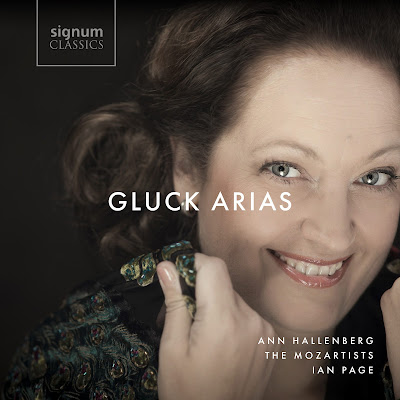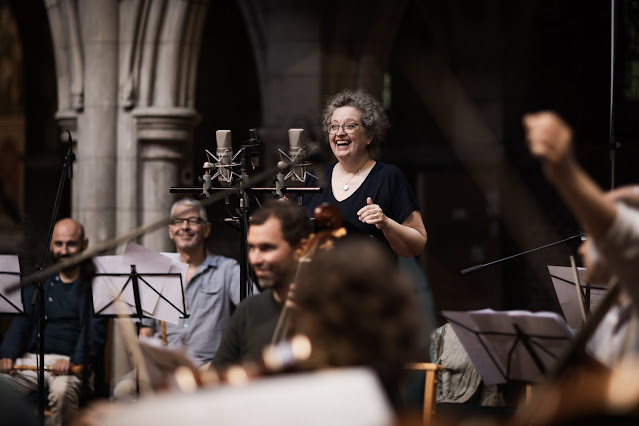 |
| Ann Hallenberg, The Mozartists, Ian Page recording Gluck Arias (Photo: Ben Ealovega) |
Swedish mezzo-soprano Ann Hallenberg has a new album out. For Gluck Arias on Signum Classics, she joined forces with conductor Ian Page, with whom she has had a long and fruitful relationship, and The Mozartists for a programme of arias from Gluck’s operas, both known – Orfeo ed Euridice, Paride ed Elena – and unknown – Il trionfo di Clelia, Ipermestra, Ezio, Il Parnaso confuso, Semiramide riconosciuta, and Le nozze d’Ercole e d’Ebe. The operas stretch right across Gluck’s career from his first complete surviving opera, Ipermestra (1744), to Paride ed Elena (1770). Their selection takes in both the original 1762 version of Orfeo ed Euridice and the rarely performed revised version Gluck produced for Parma in 1769. The disc has already received plaudits in the press with the Gramophone referring to it as “this skilfully curated exposition of Gluck’s humane genius“.
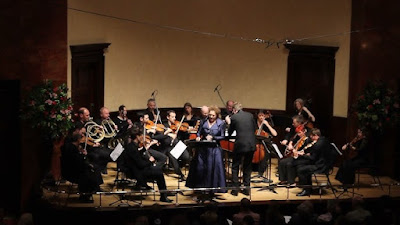 |
| Ann Hallenberg, The Mozartists, Ian Page at Wigmore Hall in 2016 |
Ann explains that the idea of the disc has been bubbling away for around ten years. Back in 2016, she performed at Wigmore Hall with Ian Page and the Mozartists, when they included a couple of Gluck arias. These went down well, and both Ann and Ian thought this might be a disc. Their relationship developed subsequently; not only has she performed with The Mozartists again (including at Wigmore Hall in 2023), but when she was artist in residence at Drottningholm, she invited Ian to conduct the production of Handel’s Ariodante with Ann in the title role. She comments that it is nice to meet a conductor where you both think the same way, so you do not have to discuss everything. Things flow very easily with him.
They started with far more material than would be needed for a disc, sifting through the arias, checking that not only was the music suitable for Ann’s voice but that she liked the aria. Often with recital discs, she explains that the selection must take account of the instruments available, but this time there were no such restrictions. She had the luxury of singing with a full orchestra. The result, she feels, is a good programme with a good mix of different sounds and colours.
She has only been able to sing a couple of Gluck’s roles on stage, mainly Orfeo and Alceste, though she laughingly told me about singing in the chorus for Iphigenie en Tauride at Drottningholm back in 1992. This led us into a brief diversion as I had seen Blackheath Halls Opera performing the work the previous night [see my review].
One of the problems with Gluck is that if you take out the three Reform opera – Orfeo ed Euridice, Alceste, Paride ed Elena – which were a bit special for Gluck [read more in my feature about Reform opera], Ann feels that the remainder of his works are a bit tricky to craft on stage. The operas sit between Baroque and Classical. She points out that we know the rules for the operas of Handel and Vivaldi, and for Mozart. But Gluck’s operas, which come between them, remain uncharted territory and it can be hard work to make the pieces come alive on stage. Ann loves Gluck, but feels that this difficulty is why the operas are not often staged. The plots remain largely Baroque; Gluck would set librettos by Metastasio, including five of the works on the disc. Yet the music has moved on, closer to the Classical era.
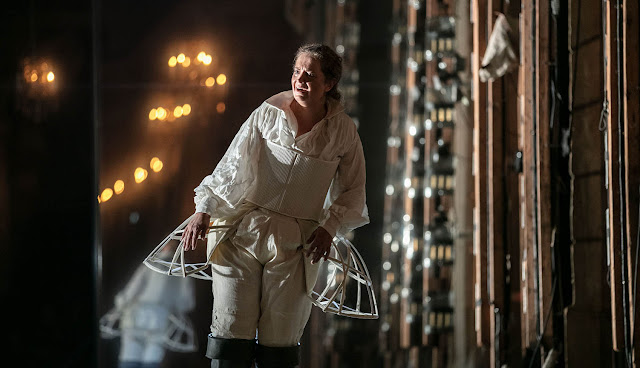 |
| Ann Hallenberg in the title role of Handel’s Ariodante at Drottningholm Palace Theatre (Photo: Mats Bäcker) |
In the UK, we rather associate Ann with Baroque repertoire, and though the music she sings is wider than that, the centre of gravity of her repertoire tends towards the Baroque. But she is also known for her Mahler, has been singing a lot of Berlioz and sings Rossini’s operas. She does not feel limited by the way the focus of her performances can be on Handel, but she does point out that the limitations can often be that she is restricted to performing the things people know. When presented with rare repertoire and lesser-known contemporaries of the great composers, people shy away. The problem is not so much the audience, but that some promoters and venues are reluctant to trust the audience and the performers, though she admits that some do.
She enjoys singing the more symphonic repertoire, but finds that in 19th-century opera, audiences can have a rather fixed opinion of how things should go. With Rossini, for instance, she finds that a lot of audiences can have a view of the works that is based on how the operas were performed during the Rossini revival of the 1940s and 1950s. But when performing these operas, Ann returns to the music and bases her performance on that. She has performed a lot of Rossini but admits that she has turned down engagements where her performance might not satisfy the preconceptions of the audience. She points out that if you have grown up with a particular recording, then it can be difficult to change your view of how it is supposed to sound.
As a young singer, she had no thought of specialising in Baroque opera;
she had no specialist training and did not study at a place like the Basel Schola Cantorum.
She simply picked things up from working with conductors and
orchestras. It helped that she was interested in the music of the
period, and it suits her voice with her quick coloratura and
mezzo-soprano range. Whilst the mezzo-soprano voice hardly existed in
the Baroque era, she has a similar tessitura to castrato voices, and the
music written for them is a good fit for her.
Her Plan B was to study history and archaeology, subjects that have always interested her. And she feels that her musical approach is akin to this as she figures things out and studies what is possible. She does experiments with the voice, asking if something is possible, very much akin to experimental archaeology. And she takes this approach with the music of all epochs.
As a student, she did not have a particular plan. She studied at the Royal College of Music, Stockholm, with Kerstin Meyer and Erik Saedén; she undertook further study in London with Joy Mammen. Early on in her career, she gave 75 performances in the title role of Bizet’s Carmen, and only Handel’s Agrippina in her more recent roles has come anywhere near this number.
Gluck apart, her other current project is Freezing Italians. This is a programme with Concerto Copenhagen
and Lars Ulrich Mortensen, celebrating the Mingotti Italian opera
troupe that toured Denmark and Sweden in the 18th century. The Italian
impresario, Pietro Mingotti (1720-1759), created the troupe in Prague in
1732, and they toured Germany and Austria, and were invited to
Copenhagen in 1747 by Louise, Queen of Denmark. Whilst the troupe is
known about in Denmark and to a lesser extent in Sweden, no-one had
explored them, and she became curious. For a time, Gluck was associated
with the troupe. He conducted them in his opera Le nozze d’Ercole e d’Ebe
(which is on Ann’s new Gluck disc) in Dresden for a royal wedding. Ann
is performing arias from operas composed for the troupe, which they
performed in Denmark and Sweden, including music by Sarti, Uttini, Scalabrini, and Chelleri. Though their repertoire also included more
famous music in pasticcios. A disc is planned for next summer.
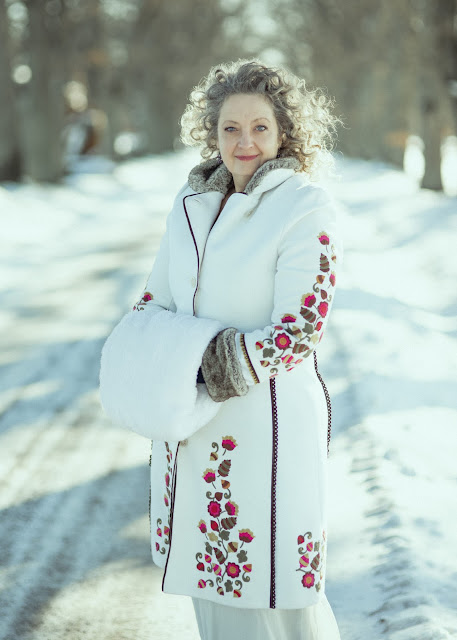 |
| Ann Hallenberg (Photo: Örjan Jakobsson) |
The world around these 18th-century opera singers fascinates her. She knows what her own travelling life is like and wonders what it was like at that period when everything took longer. The singers still travelled a lot. And another of her concert programmes deals with a singer whose travels included performances in Dresden, Venice, Verona and then back to Dresden, that is two traversals of the Alps, all within a couple of weeks. An astonishing feat, she feels. They seemed to travel as much as modern singers; they knew each other and made friendships. She wonders what life was like for them and admits that if she ever wrote a book, it would be on this subject, the realities of a touring singer’s life in the 18th century.
Our talk wandered onto the subject of recitatives, one of the areas where an 18th-century singer would have a considerable amount of work learning. She commented on Alessandro Scarlatti’s operas, where the recitatives are so well written, though she admits that not all 18th-century operas are that way. And then there is Giuseppe Maria Orlandini, whose beautiful recitatives really have to be learned properly.
As regards roles, she has a soft spot for Handel’s Agrippina, calling her a great character, and Dejanira in Handel’s Hercules comes close in the favourite stakes. These are strong women; there are so many things you can do with their wonderful music. She points out that in most major roles in Baroque opera, you get so many different colours to play with as every aria has a different face to it – pride, envy, jealousy and so on – you get to display a complete picture of the character. And major roles get lots of arias, and she mentions an opera written by Orlandini where soprano Faustina Bordone had seven arias. In later operas, the characters tend to have one or two mindsets; if you are playing an unhappy princess, then that is what the music depicts.
When I asked about other favourite roles, she laughingly suggested Scarpia as the ultimate! But she has enjoyed her Rossini roles, particularly Rosina in Il Barbiere di Siviglia, Isabella in L’Italiana in Algeri and the title role in Semiramide, though she did particularly enjoy the comic roles. In the other direction, she highlighted Monteverdi’s L’Incoronazione di Poppea.
Interviewing Ann Hallenberg was a great delight. She is someone who wears her learning lightly and, despite having great knowledge and insight, also laughs a lot. Even over Zoom, the warmth of her personality came through.
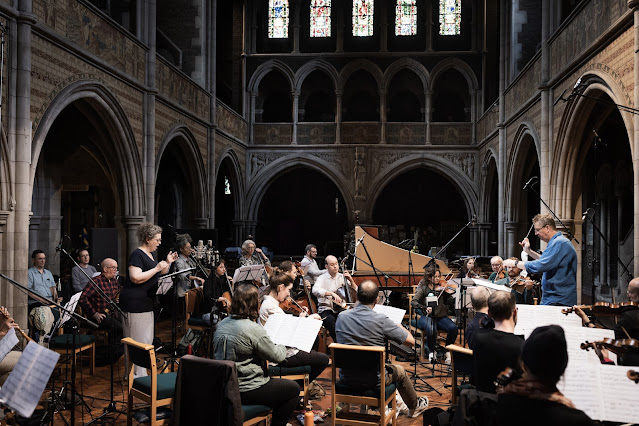 |
| Ann Hallenberg, The Mozartists, Ian Page recording Gluck Arias (Photo: Ben Ealovega) |
Gluck Arias with Ann Hallenberg, The Mozartists and Ian Page was released on Signum Classics in September – SIGCD921
The blog is free, but I’d be delighted if you were to show your appreciation by buying me a coffee.
Elsewhere on this blog
- Not so slight & surprisingly experimental: the Royal Opera & La Nuova Music bring a touch of 1930s glamour to Handel’s Giustino – opera review
- Berlin Diary: Tony Cooper finds time to fit in a thrilling concert by the Berlin Philharmonic & Daniele Gatti – review
- There was nothing semi- about the performances: we were drawn into this quirky world: ENO’s production of Britten’s Albert Herring – review
- In the moment: John Butt & the OAE explore the glorious richness of Handel’s Solomon as the opener to their anniversary season – review
- Letter from Florida: Stéphane Denève conducts Beethoven’s Eroica – concert review
- Speaking the language of the past: Patrick Ayrton on Astrophil & Stella inspired by the world of English 17th-century composers – interview
- Engagingly modern: Rossini’s Cinderella at ENO is given a modern updating by Julia Burbach – opera review
- No easy options: Estonian Philharmonic Chamber Choir & Tallinn Chamber Orchestra celebrate Arvo Pärt at 90 at Barbican – concert review
- Dresden-born composer, Sven Helbig’s Requiem A marks the 80th anniversary of the ending of World War II – concert review
- Home



